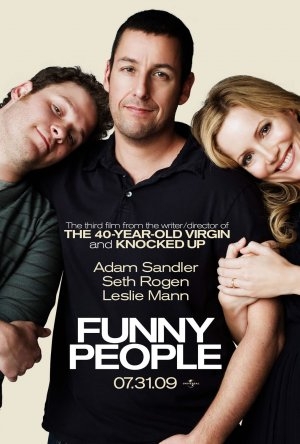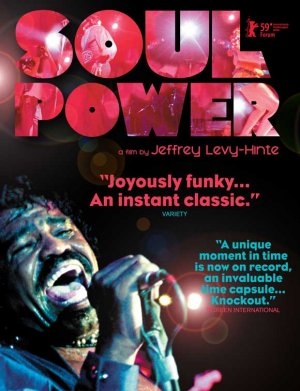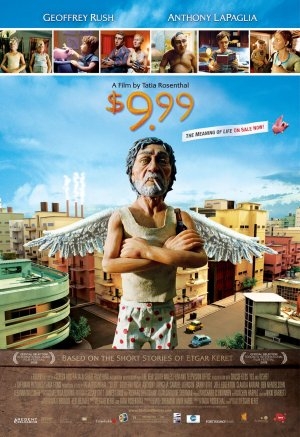 FUNNY PEOPLE (2009, directed by Judd Apatow, 146 minutes, U.S.)
FUNNY PEOPLE (2009, directed by Judd Apatow, 146 minutes, U.S.)
SOUL POWER (2009, directed by Jeffrey Levy-Hinte, 93 minutes, U.S.)
$9.99 (2006., directed by Tatia Rosenthal, 78 minutes, Israel/Australia)
BY DAN BUSKIRK FILM CRITIC
Right from the start Funny People, the third film from director Judd Apatow, seems to have a few big things working against it, number one being the aging moron comic Adam Sandler. Not just Sandler but Sandler in a cancer dramedy that clocks in at a laugh-exhausting two hours and twenty minutes. Stunt casting, ballooning lengths and again with the endless guy-hang talk; it seems as if Apatow could be headed up his own rectum on a mission to become the Quentin Tarantino of film comedy.
But great talents overcome great obstacles; somehow Judd Apatow has taken these elements and transformed them into his most sustained and thoughtful film yet. And surprisingly, his funniest. Similar to Woody’s transformation from slapstick shmoe to leading man, Funny People is Apatow’s Annie Hall, the film that finally supplies the depth as skillfully as the jokes.
Seth Rogen co-stars as Ira Wright, a budding young comic who is struggling to be funny while his roommates (Leo and Mark, played by Apatow regular Jonah Hill and Rushmore’s Jason Schwartzman) comedic careers begin to leave his in the dust. Things take a sudden turn for Ira when comic superstar George Simmons (Sandler) takes a shine to him and hires as a joke writer/assistant. Despite his success, George is a friendless, miserable mess, a situation that only get worse when he discovers he has a highly aggressive form of leukemia. Ira’s job goes from writer to confidant to paid best friend, while George mentors the earnest younger guy in art of being funny.
And funny they are. Sandler is at that awkward age, where it may have been humorous to watch a dim-witted young man pratfall and talk baby talk, it gets increasingly more off-putting to watch a middle aged man act that way (remember those painful final films of The Three Stooges?). Sandler has attempted more nuanced roles in recent years, in Paul Thomas Anderson’s Punch Drunk Love and James Brooks’ Spanglish, but each performances contained jarring flashes of the goofball comedian within. Here, in a role Apatow wrote specifically for his one-time roommate, Sandler can slip into laugh mode naturally, then return back to the exhausted and alienated mood his character seems to exist in. As for Rogen, he’s in his prime as a young comic actor. Like a young Albert Brooks, Rogen displays a highly developed timing and a classic comic persona of a hard-working everyman on the verge of panic.
In the final act, Funny People shifts gears and take us out of L.A. and into the suburbs of Marin County, where George faces the domestic life he could have had with the woman that got away (Leslie Mann, Apatow’s wife). The film and George himself seem to strive for a happy ending that is beyond their reach, but it inability to get to the happily-ever-after reflects the restlessness that is in the souls of these stand-ups. They may dream up the funniest joke of all-time, yet after the laughing dies down the audience is always going to be expecting another.
– – – – – – – –
A major discovery for fans of seventies soul and funk music Soul Power is a newly forged documentary , constructed from  footage shot in 1974 during the music festival that coincided with Muhammad Ali’s fight with George Foreman in Zaire, Africa. A documentary of this “U.S. meets Africa” musical summit was planned then abandoned decades ago but has now been constructed by director Jeffrey Levy-Hinte in what will go down as one of the quintessential documents of black music of the ’70s. Soul Power is completely lacking in modern enhancements, no zoomy graphics or modern talking heads looking back; instead you’re just a fly on the wall for the build-up of a musical event featuring the almighty James Brown, B.B. King, The Spinners, Bill Withers, The Crusaders, Celia Cruz and the Fania All-Stars and from the African side, Miriam Makeba, OK Jazz, Manu Dibango and Orchestre Afrisa International with Tabu Ley.
footage shot in 1974 during the music festival that coincided with Muhammad Ali’s fight with George Foreman in Zaire, Africa. A documentary of this “U.S. meets Africa” musical summit was planned then abandoned decades ago but has now been constructed by director Jeffrey Levy-Hinte in what will go down as one of the quintessential documents of black music of the ’70s. Soul Power is completely lacking in modern enhancements, no zoomy graphics or modern talking heads looking back; instead you’re just a fly on the wall for the build-up of a musical event featuring the almighty James Brown, B.B. King, The Spinners, Bill Withers, The Crusaders, Celia Cruz and the Fania All-Stars and from the African side, Miriam Makeba, OK Jazz, Manu Dibango and Orchestre Afrisa International with Tabu Ley.
After an enticing opening showing James Brown (wearing an awesome denim jumpsuit with puffy sleeves) and his band surging through a live take of the title tune, Soul Power sits back to observe the whirlwind of activity before the concert kicks off. For fans of black culture it’s a people watchers delight, seeing the type of outrageous fashions show people wear in their off-hours, seeing exiled radical Stokely Carmichael survey the scene and listening to the always talkative Muhammad Ali, as he philosophizes about race and colonialism as well as sparring a little with lead Spinner Phillipe Wynn (who gives an inadvertent terrified yelp when Ali moves in with the speed of a panther).
All these peripheral moments build anticipation for the performances of the second half, where all except for The Godfather of Soul are awarded a single song highlight of their sets, leading us through one chill-inducing moment after another (special mention going to Bill Withers, who contrasts the rhythmic sublimity with a wrenching acoustic number “I Hope She’ll Be Happier”). Then it ends with James Brown and his large band version of The J.B.s, basically burning down the universe, leaving behind something much funkier. If you’re a fan of the era’s music you’ll leave completely satisfied except for the greedy nagging desire telling you that ninety-three minutes ain’t enough.
– – – – – – – – – – –
 $9.99 is a collection of lovelorn and lonely tales from the pen of Israeli short story writer Etgar Keret, best known to cinema fans as the writer behind Wristcutters: A Love Story. It is guilty of leaning heavily on what has become the storytelling cliche of our era: introducing a bunch of seemingly unconnected stories and weaving them together with fate and coincidence. There’s a fiancee who won’t grow up (symbolized by three partying thumb-tall yahoos who drink beer with him in his apartment), a homeless man who dies and transforms into a winged, cynical angel, a furniture mover who shaves himself hairless for his super model girlfriend and a directionless twenty-something who sends $9.99 away to buy a book on the meaning of life.
$9.99 is a collection of lovelorn and lonely tales from the pen of Israeli short story writer Etgar Keret, best known to cinema fans as the writer behind Wristcutters: A Love Story. It is guilty of leaning heavily on what has become the storytelling cliche of our era: introducing a bunch of seemingly unconnected stories and weaving them together with fate and coincidence. There’s a fiancee who won’t grow up (symbolized by three partying thumb-tall yahoos who drink beer with him in his apartment), a homeless man who dies and transforms into a winged, cynical angel, a furniture mover who shaves himself hairless for his super model girlfriend and a directionless twenty-something who sends $9.99 away to buy a book on the meaning of life.
Trite revelations about loneliness and life abound, although it is all nearly redeemed by its swift seventy-eight minute length and some completely captivating Davey and Goliath-style figure animation. There is excellent voice work, from a cast that includes Anthony LaPaglia and Geoffrey Rush but the real star for me was all the distractingly beautiful little lamps, telephones, splattered brains and the saggy & fornicating bodies of the sad little figures. Cinema is a visual medium after all, and director Tatia Rosenthal has an unusually astute visual eye. It nearly makes up for the soggy thoughts that come from these animated little mouths.
